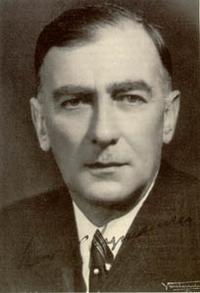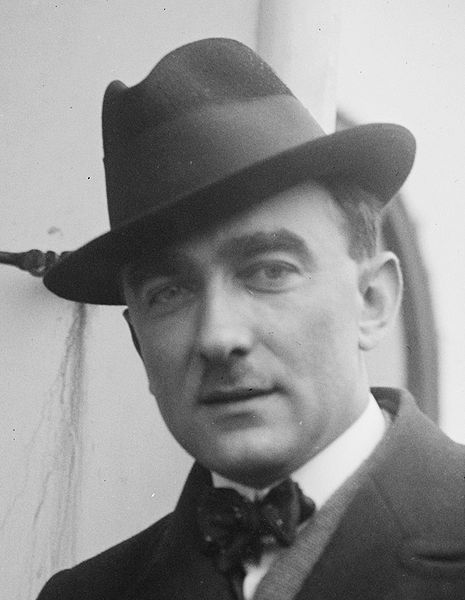KAROL SZYMANOWSKY
muzicafe :: KLASİK MÜZİK :: KOMPOZİTÖRLER :: BESTECİLER
1 sayfadaki 1 sayfası
 KAROL SZYMANOWSKY
KAROL SZYMANOWSKY
Karol Maciej Szymanowski (3 October 1882 – 28 March 1937) was a Polish composer and pianist.

Nowy Świat 47, Warsaw, Poland. Szymanowski lived and composed here in 1924–29. Szymanowski was born into a wealthy land-owning Polish gentry family (of the Korwin/Ślepowron coat-of-arms) in Tymoszówka, then in the Russian Empire, now in Cherkasy Oblast, Ukraine. He studied music privately with his father before going to Gustav Neuhaus' Elizavetgrad School of Music from 1892. From 1901 he attended the State Conservatory in Warsaw, of which he was later director from 1926 until retiring in 1930. Musical opportunities in Russian-occupied Poland being quite limited at the time, he travelled widely throughout Europe, North Africa, the Middle East, and the US. These travels, especially those to the Mediterranean area, provided much inspiration to the composer and esthete.
The fruits of these trips included not only musical works, but poetry and his novel on Greek love Efebos, parts of which were subsequently lost in a fire in 1939. The central chapter was translated by him into Russian and given as a gift in 1919 to Boris Kochno, who was his beloved at the time. Szymanowski also wrote a number of love poems, in French, to the 15-year-old boy. Among these are Ganymède, Baedecker, N'importe, and Vagabond.
Writing about his novel, Szymanowski said, "In it I expressed much, perhaps all that I have to say on this matter, which is for me very important and very beautiful." It remains available in a German translation as Das Gastmahl. Ein Kapitel aus dem verlorenen Roman Ephebos.
Szymanowski maintained a long correspondence with pianist Jan Smeterlin, who was a significant champion of his piano works. Their correspondence was published by Allegro Press in 1969.
Szymanowski died in a sanatorium in Lausanne, Switzerland from tuberculosis.
Influences
Szymanowski was influenced by the music of Richard Wagner, Richard Strauss, Max Reger, Alexander Scriabin and the impressionism of Claude Debussy, and Maurice Ravel. He also drew much influence from his countryman Frédéric Chopin and from Polish folk music. Like Chopin he wrote a number of mazurkas for piano. He was specifically influenced by folk music from the Polish Highlands [Górale], which he discovered in Zakopane, in the southern Tatra highlands, even writing in an article entitled About Górale Music: "My discovery of the essential beauty of Górale (Polish Highlander) music, dance and architecture is a very personal one; much of this beauty I have absorbed into my innermost soul." (p. 97) According to Jim Samson (1977, p. 200), it is "played on two fiddles and a string bass," and, "has uniquely 'exotic' characteristics, highly dissonant and with fascinating heterophonic effects." Carefully digesting all these elements, eventually Szymanowski developed a highly individual rhapsodic style and a unique harmonic world of his own.
Works
Szymanowski's Zakopane house, the Villa Atma—now the Karol Szymanowski MuseumMain article: List of compositions by Karol Szymanowski
Among Szymanowski's better known orchestral works are four symphonies (No. 3, Song of the Night with choir and vocal soloists and No. 4, Symphonie Concertante, with piano concertante) and two dream-like violin concertos. His stage works include the ballets Harnasie and Mandragora and the operas Hagith and Król Roger ('King Roger'). He wrote much piano music, including the four Etudes, Op. 4 (of which No. 3 may be his single most popular piece), many mazurkas and the exquisite and highly individual Metopes. Other works include the Three Myths for violin and piano, two masterful string quartets, a sonata for violin and piano, a number of orchestral songs (some to texts by Hafez and James Joyce) and his Stabat Mater, an acknowledged choral masterpiece.
According to Samson (p. 131), "Szymanowski adopted no thorough-going alternatives to tonal organization [...] the harmonic tensions and relaxations and the melodic phraseology have clear origins in tonal procedure, but [...] an underpinning tonal framework has been almost or completely dissolved away."


Nowy Świat 47, Warsaw, Poland. Szymanowski lived and composed here in 1924–29. Szymanowski was born into a wealthy land-owning Polish gentry family (of the Korwin/Ślepowron coat-of-arms) in Tymoszówka, then in the Russian Empire, now in Cherkasy Oblast, Ukraine. He studied music privately with his father before going to Gustav Neuhaus' Elizavetgrad School of Music from 1892. From 1901 he attended the State Conservatory in Warsaw, of which he was later director from 1926 until retiring in 1930. Musical opportunities in Russian-occupied Poland being quite limited at the time, he travelled widely throughout Europe, North Africa, the Middle East, and the US. These travels, especially those to the Mediterranean area, provided much inspiration to the composer and esthete.
The fruits of these trips included not only musical works, but poetry and his novel on Greek love Efebos, parts of which were subsequently lost in a fire in 1939. The central chapter was translated by him into Russian and given as a gift in 1919 to Boris Kochno, who was his beloved at the time. Szymanowski also wrote a number of love poems, in French, to the 15-year-old boy. Among these are Ganymède, Baedecker, N'importe, and Vagabond.
Writing about his novel, Szymanowski said, "In it I expressed much, perhaps all that I have to say on this matter, which is for me very important and very beautiful." It remains available in a German translation as Das Gastmahl. Ein Kapitel aus dem verlorenen Roman Ephebos.
Szymanowski maintained a long correspondence with pianist Jan Smeterlin, who was a significant champion of his piano works. Their correspondence was published by Allegro Press in 1969.
Szymanowski died in a sanatorium in Lausanne, Switzerland from tuberculosis.
Influences
Szymanowski was influenced by the music of Richard Wagner, Richard Strauss, Max Reger, Alexander Scriabin and the impressionism of Claude Debussy, and Maurice Ravel. He also drew much influence from his countryman Frédéric Chopin and from Polish folk music. Like Chopin he wrote a number of mazurkas for piano. He was specifically influenced by folk music from the Polish Highlands [Górale], which he discovered in Zakopane, in the southern Tatra highlands, even writing in an article entitled About Górale Music: "My discovery of the essential beauty of Górale (Polish Highlander) music, dance and architecture is a very personal one; much of this beauty I have absorbed into my innermost soul." (p. 97) According to Jim Samson (1977, p. 200), it is "played on two fiddles and a string bass," and, "has uniquely 'exotic' characteristics, highly dissonant and with fascinating heterophonic effects." Carefully digesting all these elements, eventually Szymanowski developed a highly individual rhapsodic style and a unique harmonic world of his own.
Works
Szymanowski's Zakopane house, the Villa Atma—now the Karol Szymanowski MuseumMain article: List of compositions by Karol Szymanowski
Among Szymanowski's better known orchestral works are four symphonies (No. 3, Song of the Night with choir and vocal soloists and No. 4, Symphonie Concertante, with piano concertante) and two dream-like violin concertos. His stage works include the ballets Harnasie and Mandragora and the operas Hagith and Król Roger ('King Roger'). He wrote much piano music, including the four Etudes, Op. 4 (of which No. 3 may be his single most popular piece), many mazurkas and the exquisite and highly individual Metopes. Other works include the Three Myths for violin and piano, two masterful string quartets, a sonata for violin and piano, a number of orchestral songs (some to texts by Hafez and James Joyce) and his Stabat Mater, an acknowledged choral masterpiece.
According to Samson (p. 131), "Szymanowski adopted no thorough-going alternatives to tonal organization [...] the harmonic tensions and relaxations and the melodic phraseology have clear origins in tonal procedure, but [...] an underpinning tonal framework has been almost or completely dissolved away."

muzicafe :: KLASİK MÜZİK :: KOMPOZİTÖRLER :: BESTECİLER
1 sayfadaki 1 sayfası
Bu forumun müsaadesi var:
Bu forumdaki mesajlara cevap veremezsiniz